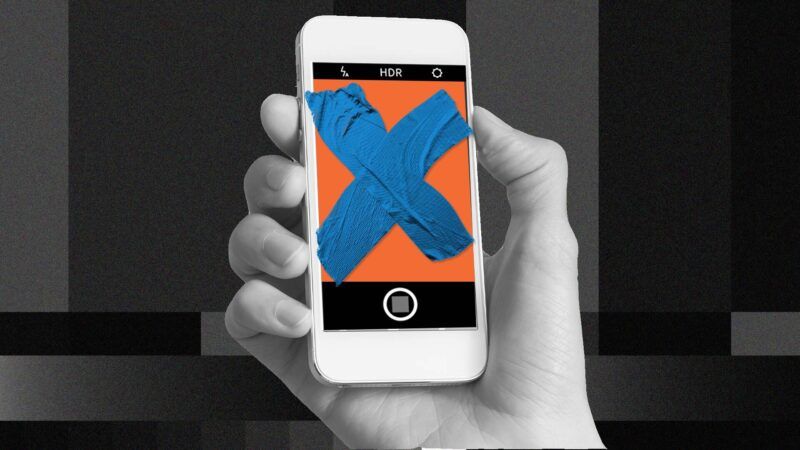Twitter's New 'Privacy' Policy Could Destroy Its Value for Decentralized Citizen Journalism
Why give legacy media a stranglehold over information that Twitter at its best is great for sharing?

In the halcyon days when people were still optimistic about social media's power to do good in the world, they would point to moments like the "Arab Spring"—a time when private citizens regularly used Twitter as a tool to report accurately on what was happening under tyrannical regimes. Even in less geopolitically fraught situations, many incidents of police abuse and other crimes, both official and unofficial, have been recorded by citizen-journalists on their phones' cameras. That, for example, was how we saw the murder of George Floyd: from bystander video, not carefully vetted professional media.
Twitter seemed tailor made for that sort of journalism. It lets us see events almost in real time, events involving identifiable, not-yet-famous human beings caught in the act of being themselves. Yet the site just announced a new policy, in the name of "privacy," that if consistently applied would destroy this value —and if inconsistently applied, as it will of course be, would make Twitter's power to shape what information reaches its users more pernicious.
The details—announced, perhaps coincidentally, right after Jack Dorsey stepped down as CEO seat—start off with the kind of framing that Twitter knows will ring the bell of the currently dominant media professionals:
Sharing personal media, such as images or videos, can potentially violate a person's privacy, and may lead to emotional or physical harm. The misuse of private media can affect everyone, but can have a disproportionate effect on women, activists, dissidents, and members of minority communities. When we receive a report that a Tweet contains unauthorized private media, we will now take action…
While our existing policies and Twitter Rules cover explicit instances of abusive behavior, this update will allow us to take action on media that is shared without any explicit abusive content, provided it's posted without the consent of the person depicted. This is a part of our ongoing work to align our safety policies with human rights standards, and it will be enforced globally starting today.
The company then claims that it has always been quashing tweets that expose private individuals' home addresses or identity documents. But now, it says, you can also be in violation merely by sharing "media of private individuals without the permission of the person(s) depicted."
If someone doesn't want to be in a photo or video circulating on Twitter—perhaps someone committing a crime or otherwise participating in a public action of obvious newsworthiness—then Twitter says now that "When we are notified by individuals depicted, or by an authorized representative, that they did not consent to having their private image or video shared, we will remove it."
The company leaves a vague and judgment-riddled exception for "when media and accompanying Tweet text are shared in the public interest or add value to public discourse." Thus, they hedge, "We recognize that there are instances where account holders may share images or videos of private individuals in an effort to help someone involved in a crisis situation, such as in the aftermath of a violent event, or as part of a newsworthy event due to public interest value, and this might outweigh the safety risks to a person."
It might. Twitter continues: "we would take into consideration whether the image is publicly available and/or is being covered by mainstream/traditional media (newspapers, TV channels, online news sites), or if a particular image and the accompanying tweet text adds value to the public discourse, is being shared in public interest, or is relevant to the community."
This policy will thus add more strength to the hold conventional media businesses have on the public mind, the very thing decentalized communication tools like Twitter at their best were supposed to circumvent. But Twitter seems less interested now in disrupting the legacy media's hold on our information flow, and more interested in aggressively ensuring its corporate judgments overwhelm its users' desire to spread or receive information they might not be able to get elsewhere. (Twitter isn't the only effective social network, of course, but we have reason to fear collusion from tech companies when they decide to crack down on practices, ideas, or methods they find objectionable.)
We are already seeing various ideological sides trying to weaponize this policy against their enemies.
Will this policy lead to the death of the "private individual being an asshole in public and being dragged all across the planet because someone shoved a camera in their face," which probably amounts to at least a third of some users' love of Twitter? Sounds like it should, though that will likely depend on Twitter's opinions about the particular awfulness of the particular behavior and the expressions or attitudes that Twitter wants to discourage.
Twitter has already been a machine of often clumsy and little-explained attempts to carefully manage and vet what it lets its users communicate. But by taking the trouble to enshrine this policy, it seems to be sending a signal that the legacy media are the rightful jealous powers defining the public discourse.


Show Comments (117)